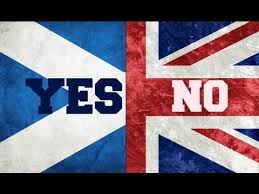By Ashley-Kate McCann
Contributing Writer
Update:
SCOTLAND- The nation of Scotland voted to remain part of Great Britain yesterday in one of the closest in the nation’s history. Fifty-five percent of the nation voted to remain loyal and 45 percent wished to become independent, according to CNN.com.
CNN also reported that shortly after the vote, Alex Salmond, Scottish first minister and leader of the pro-independence Scottish National Party, announced he will resign from both posts.
End of Update
With votes currently being counted on the Scottish referendum, an international audience might think it insane in a world of globalization, a country wants to break ranks from the United Kingdom and become independent.
There are several reasons why Scotland wants to break away from the UK. Though Scotland has devolved powers – it can decide on certain policies within the country such as the way healthcare is organized – it is not in full control of its economy. Many people in Scotland are in favor of being part of the European Union. However, Britain is due to have a referendum on whether it should remain part of the EU in 2017, and if Scotland remains with the UK, its future with the EU is in jeopardy.
Being part of the European Union brings many benefits for countries. It brings together nations to form one single European Market, free trade, free movement of people among the borders of the EU as well as additional funding for less developed countries. Scotland, being part of the United Kingdom, follows the special position the UK has as part of the EU. They still use their own currency, the pound and don’t adopt all the laws and regulations brought forward by the EU.
One of the biggest disadvantages Scotland has as a mostly rural country is the UK corporation tax is 21%. Compared to other countries of the EU, Scotland is not the first place investors look for their business endeavors. The EU Common Consolidated Corporate Tax Base can be as low as 12.5%. If Scotland were to have a tax rate this low, it would be at a competitive advantage to England for potential investment. There are also cultural reasons for Scotland wanting to be independent and this may sway the vote more than economic considerations.
The reason the vote is so close is the amount of uncertainty following a “yes” vote granting Scottish independence. There are issues around what currency Scotland will use, how it will maintain links with England, if it will be able to support itself financially, if its voice will be heard in the EU as a small country and if it will even be granted access to the EU. Finally the “no” camp is worried that people of the “yes” camp are voting yes simply for cultural reasons, based on romantic ideas of national identity or due to the following of much cultural propaganda. The danger with this is that cultural reasons for voting “yes” will mean nothing if Scotland becomes an economic disaster and people are unable to feed their children.
One of the current consequences of the Scottish referendum and particularly if there is a “yes” vote, is the effect this will have on the rest of the world. Places such as Catalonia, Tibet and the Uyghur peoples, Crimea in Russia and even Northern Ireland could experience an increase in agitation and tensions following the referendum vote.
Scotland has the potential to be the new hotspot for American investment. Not only is Scotland rich with natural resources, such as oil, Scotland has much of the advantages American investors were seeking when looking at Ireland as a way to expand into Europe in the 90s. It has a young, highly educated workforce willing to take less pay to get the opportunity to work for an international company whilst also exhibiting flexibility.
Overall, the consequences of the vote are relevant to America because change in the global economy will affect the way America does business with the rest of the world.
The vote on the referendum will be released this morning. Check out thebv.org for an update on the future of Scotland.









